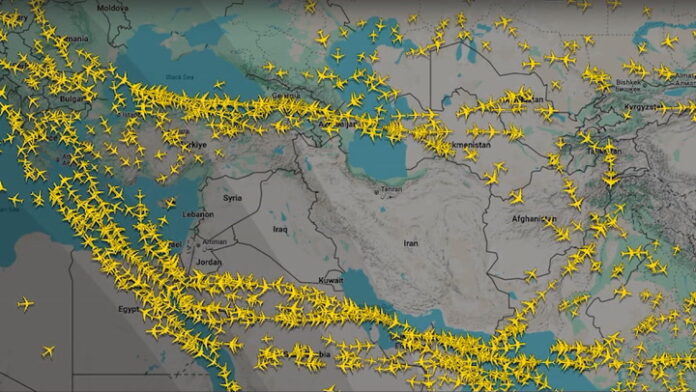Flight Suspensions and Reroutes Disrupt Key Air Corridors
Singapore Airlines halted flights between Singapore and Dubai through June 25 after a security assessment prompted by escalating tensions in the region, signaling how quickly commercial operations can change when governments order military strikes, especially as the United States targeted Iran’s Fordow, Natanz and Isfahan enrichment sites over the weekend. Multiple carriers have since avoided Middle East airspace, choosing longer paths north over the Caspian Sea or south via Egypt and Saudi Arabia, which adds both fuel expenditures and flight time, creating ripple effects across global schedules.
British Airways diverted two Dubai-bound planes mid-flight, sending one back to London Heathrow upon reaching Egyptian airspace and routing another to Zurich after more than nine hours in the air, while also suspending flights to Doha and Bahrain through June’s end. Likewise, Air France canceled services to Dubai and Riyadh, Emirates paused all flights to Iran and Iraq until June 30, and US-based carriers American Airlines and United Airlines suspended their Qatar and Dubai routes, illustrating that safety considerations now outweigh the economic benefits of using traditional shortcuts over the Persian Gulf and adjacent zones.
Operation Midnight Hammer and Regional Responses
Last Saturday, President Donald Trump announced via social media platform Truth Social that Operation Midnight Hammer had “completely and totally obliterated” Iran’s main enrichment facilities, claiming full success for the B-2 stealth bombers carrying 30,000-pound bunker busters. Iran’s Revolutionary Guards responded by warning of “regrettable responses” and designating American forces in the area as “legitimate targets,” while a parliamentary resolution conditionally approved steps to close the Strait of Hormuz—a chokepoint for a significant share of the world’s oil shipments—should further attacks occur.
This exchange marks Washington’s first direct military engagement in the Iran-Israel conflict that started on June 13. Meanwhile, commercial aviation faces a stark choice: accept higher operational costs and longer hours aloft or press ahead through contested skies and risk passenger safety as Iran’s air defenses remain on heightened alert.
Economic Impact and Industry Calculations
Longer flight paths drive up fuel consumption and crew expenses, and at a time when oil prices hover at elevated levels due to regional instability, airlines cannot absorb extra costs indefinitely without passing them to customers. Furthermore, delays cascade through hub networks, causing missed connections and crew scheduling headaches. For Asia-Europe traffic especially, which once relied heavily on direct flights over Iran and Iraqi airspace, carriers must now decide whether to book longer but safer routes or risk the political fallout of continued overflight permissions.
Personal Analysis
In my view, airlines will likely accelerate investments in flexible route-planning systems and bolster partnerships with regional governments to safeguard operations during geopolitical crises, while regulators may soon demand stricter guidelines for assessing airspace risk. As carriers adapt, passengers must brace for higher fares and longer trips, even as they prioritize safety over speed. This episode also underlines how swiftly military decisions translate into economic consequences far beyond their initial tactical goals, reminding us that in our interconnected world, no industry exists in isolation from global politics.
Sources: CNBC

